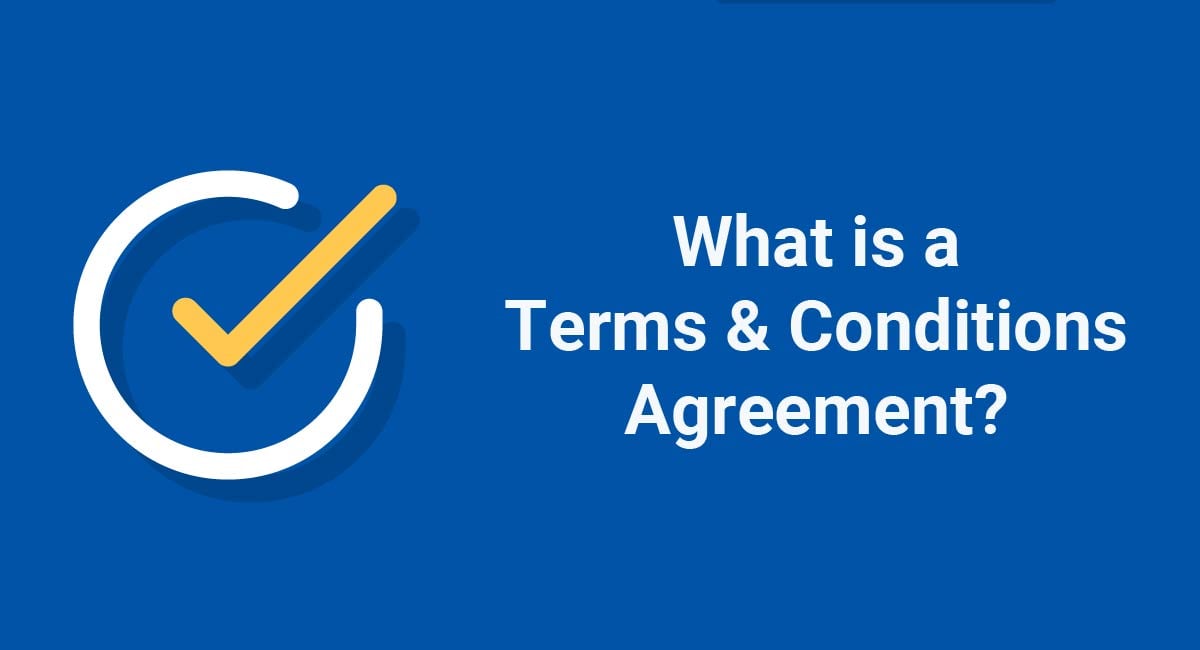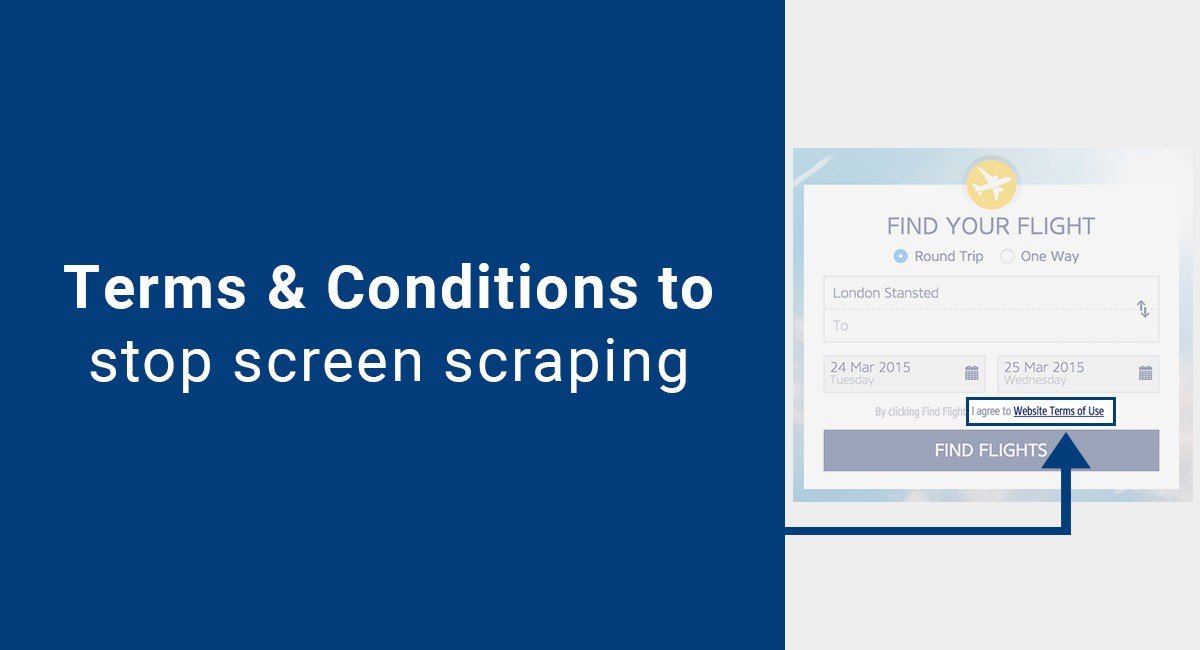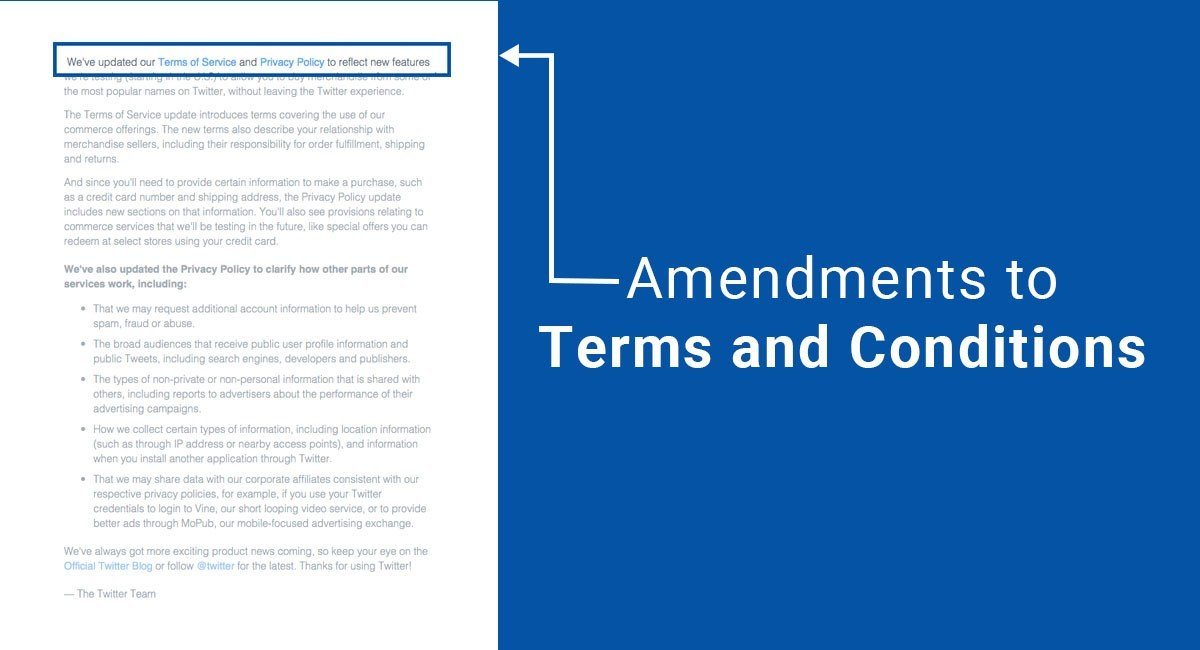Terms and Conditions are legally-binding rules that apply to your business and its customers. Every serious business has a Terms and Conditions agreement, or some other form of contract, governing its relationship with its customers.
Many of us scroll through Terms and Conditions agreements without really reading them, when installing a piece of software or paying for services. But these documents are important, and you must take great care when creating Terms and Conditions for your business.
Our Terms and Conditions Generator makes it easy to create a Terms and Conditions agreement for your business. Just follow these steps:
-
At Step 1, select the Website option or the App option or both.
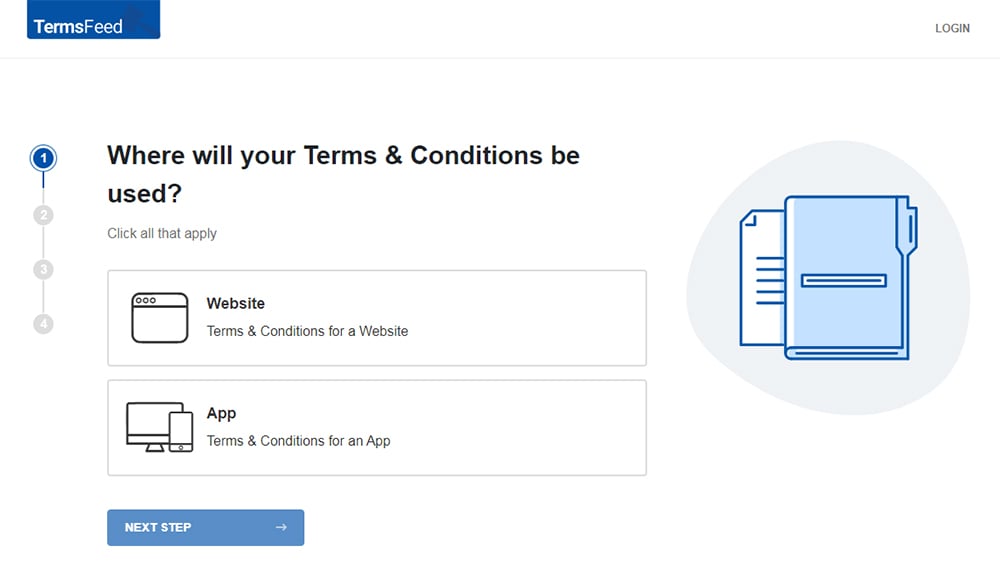
-
Answer some questions about your website or app.
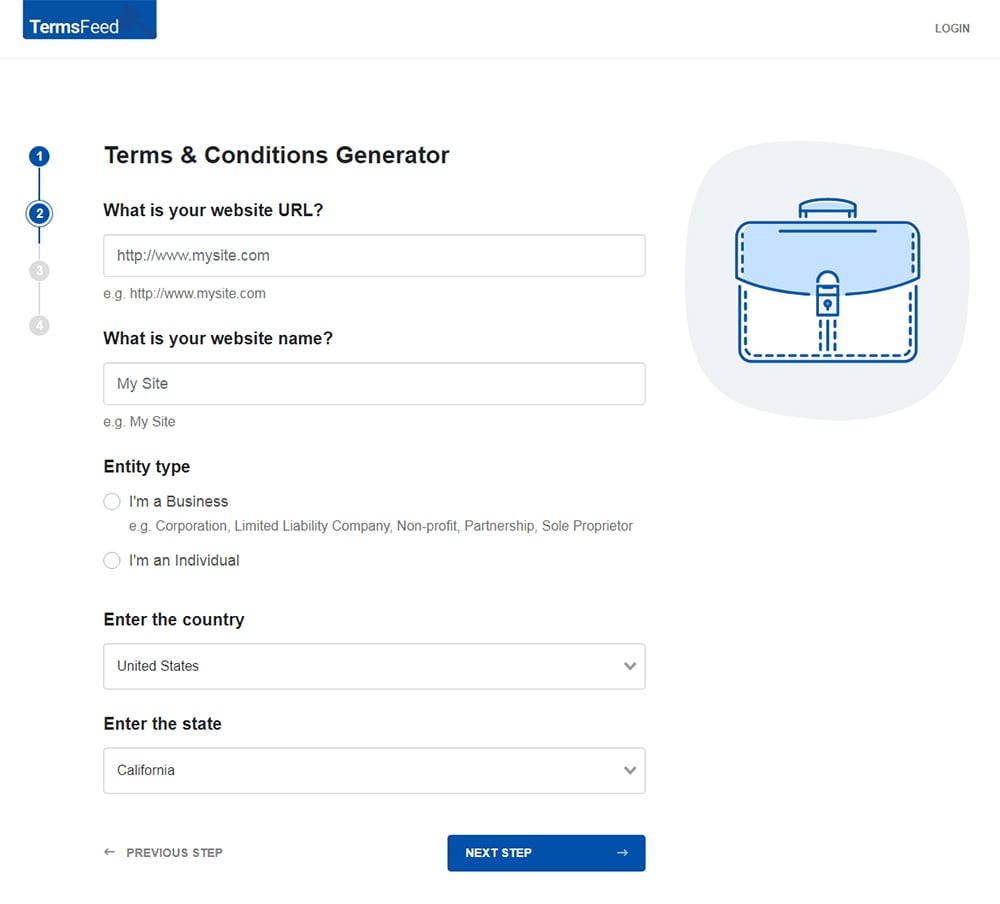
-
Answer some questions about your business.
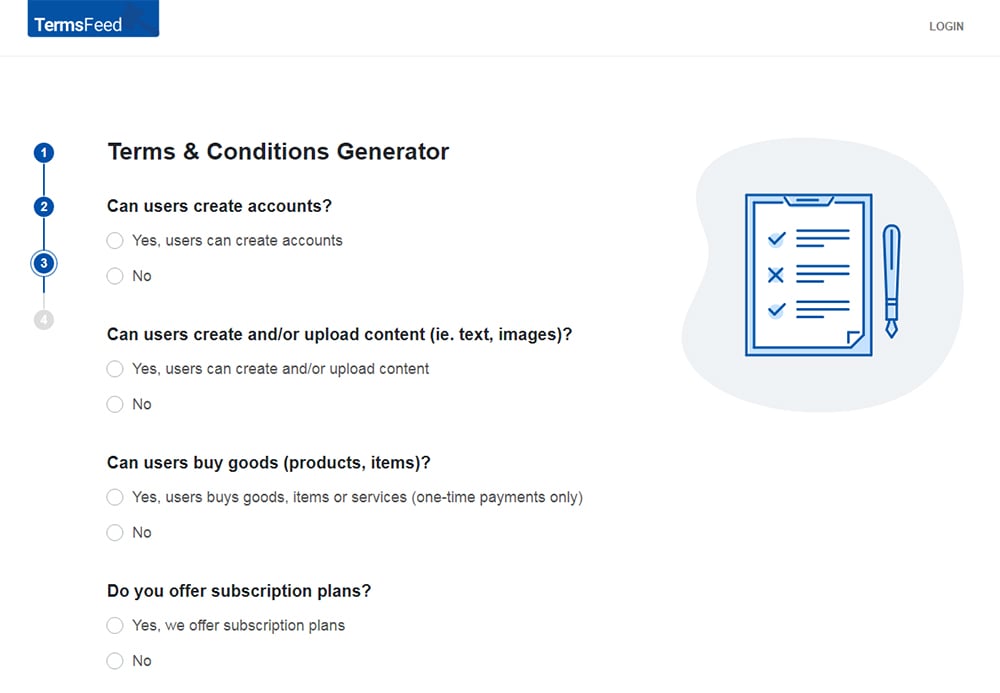
-
Enter the email address where you'd like the T&C delivered and click "Generate."
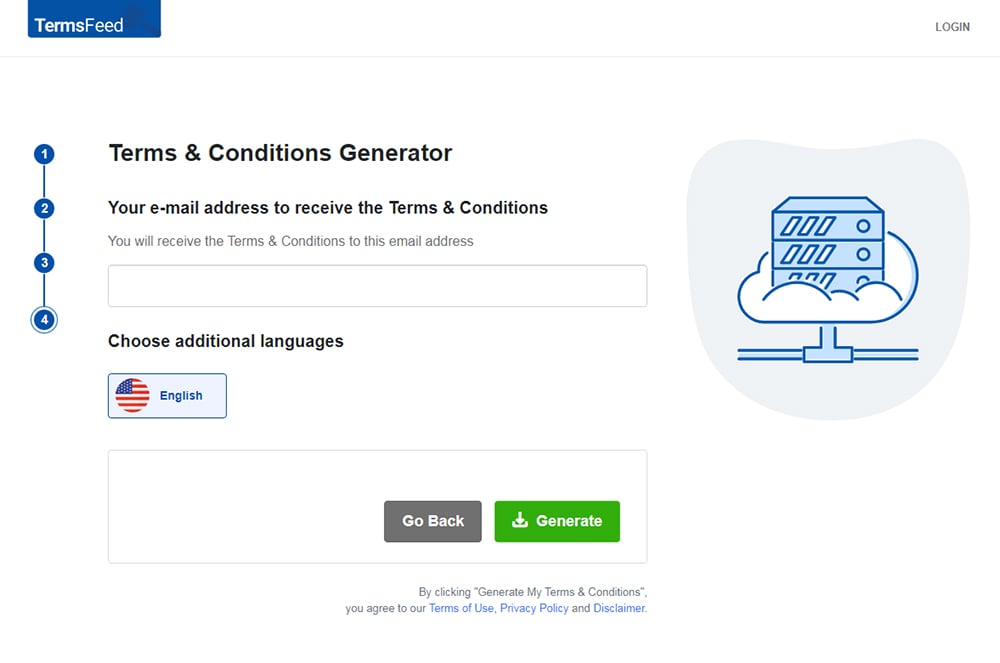
You'll be able to instantly access and download the Terms & Conditions agreement.
What is the purpose of a Terms and Conditions agreement?
The main purpose of a Terms and Conditions agreement is to set clear expectations around what your business will provide and what your customers will do in exchange.
A Terms and Conditions agreement should set out:
- What your customers can expect from your business
- What your customers must do in exchange for using your services
- How you will resolve any disputes between your business and its customers
Your Terms and Conditions can also include rules about:
- Who can use your services (e.g., only people of over a certain age or in a certain location)
- Under what conditions you can restrict, suspend, or remove a person's account
- How much your customers must pay to receive your services (if applicable)
- The extent to which you agree to be held legally liable for any damage you cause your customers (a "limitation of liability" clause)
- What will happen if your customers cause your business damage through the use of your services (an "indemnity" clause)
- The national laws that govern the interpretation of your Terms and Conditions
- The jurisdiction in which you will resolve any legal disputes with your customers
Do I need a Terms and Conditions agreement?

You don't need a Terms and Conditions agreement by law (unlike a Privacy Policy). But you should absolutely have a Terms and Conditions to help manage your relationship with customers if you:
- Sell goods through an ecommerce store
- Provide services, whether paid for or for free
- Offer a mobile app, software program, or Software as a Service (SaaS)
- Run a website (website Terms and Conditions are often called the "Terms of Use" or "Terms of Service")
Again, although you might not "need" Terms and Conditions in a legal sense, there are many benefits to having a clear set of Terms and Conditions, both for your business and its customers.
What are the benefits of having a Terms and Conditions agreement?
There are many benefits of having a Terms and Conditions agreement, including:
- It ensures your business looks professional and well-established
- It means you can enforce your rules (in court, if necessary)
- It helps your customers understand what is expected
Let's look at a hypothetical example of how a Terms and Conditions agreement can help both you and your customers.
Say you offer a 30-day free trial of your service. You request each customer's payment card information before allowing them to start their trial. Your website states that, unless they cancel before the trial is up, you'll be taking payment after 30 days.
You can expect a few customers to be charged because they forgot to cancel or misunderstood the trial. But if the rules are made clear in your Terms and Conditions agreement, and you asked them to read and agree to these before signing up, then you're protected against complaints or legal claims from unhappy customers.
Without a Terms and Conditions agreement, you might actually be breaking consumer protection law by taking payment from a customer's account in this way. You're also needlessly creating the potential for misunderstandings, dissatisfaction, and reputational damage.
It's important to note, however, that the courts will not enforce your Terms and Conditions unless they are:
- Clear and easily understandable to the customer
- Lawful, in that they don't contain any clauses that are not recognized by law
- Agreed upon, in that your customer has had a fair opportunity to read them and has actively indicated their agreement
What's the difference between a Terms and Conditions agreement and a Privacy Policy?

You'll notice that most businesses have at least two legal documents displayed on their website or in their app: a Terms and Conditions agreement and a Privacy Policy. These are very different documents.
A Privacy Policy explains how your business collects, uses, stores, and shares personal information.
One key difference between a Terms and Conditions agreement and a Privacy Policy is that a Privacy Policy is required by law. Wherever your business operates, there is almost certainly a law requiring you to create a Privacy Policy.
For example:
- United States: California Online Privacy Protection Act (CalOPPA) and California Consumer Privacy Act (CCPA)
- European Union and European Economic Area: General Data Protection Regulation (GDPR)
- United Kingdom: GDPR and Data Protection Act 2018
- Canada: Personal Information Protection and Electronic Documents Acts (PIPEDA)
- Australia: Privacy Act 1988
- South Africa: Personal Information Protection Act (POPI Act)
- Brasil: Lei Geral de Proteção de Dados (LGPD)
These laws vary significantly in what they require a business to disclose in its Privacy Policy.
Most Privacy Policies will need to cover, at a minimum:
- Contact details for your business
- What personal information you collect from your customers, visitors to your website, and other people who come into contact with your business (e.g., names, email addresses, IP address)
- The identities of any third parties with whom you share personal information (e.g., marketing companies, mail carriers, analytics providers)
- Whether and how your website or app uses cookies and other tracking technologies
- How your customers can request access to their personal information
Failing to create a Terms and Conditions can lead to legal issues if you ever need to take a customer to court, or if a customer ever takes your business to court. But failing to create a Privacy Policy can be a crime in itself.
To summarize, a Terms and Conditions agreement is an optional yet beneficial legal agreement that helps businesses maintain control over their websites and services, while setting user expectations and limitations.
You'll keep your customers informed and limit your own legal liability by having an informative Terms and Conditions agreement that your users agree to before interacting with your site or service.

Comprehensive compliance starts with a Privacy Policy.
Comply with the law with our agreements, policies, and consent banners. Everything is included.
